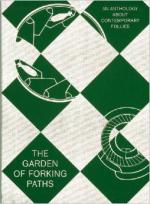|
This section contains 5,250 words (approx. 14 pages at 400 words per page) |

|
In the essay below, Yarrow examines the ways Borges forces his reader to notice the act of reading and inspire in the reader an appreciation for the aesthetic experience.
"We must never forget that [Borges's] intelligence . . . is at the service of games rather than convictions. . . .The purpose of the game is not to discover incognizable reality; it has an aesthetic aim."
The "aesthetic aim" Jurado refers to suggests that Jorge Luis Borges is concerned with the effect of his work, and that this effect may have something to do with the mental processes that give shape to what is then called reality. To suggest that Borges is concerned with stimulating the creative faculties of his audience appears legitimate; he says his work is a means of "fusing the world of the reader and the world of the book."
This possibility implies an intention similar to Robbe-Grillet's demand...
|
This section contains 5,250 words (approx. 14 pages at 400 words per page) |

|




